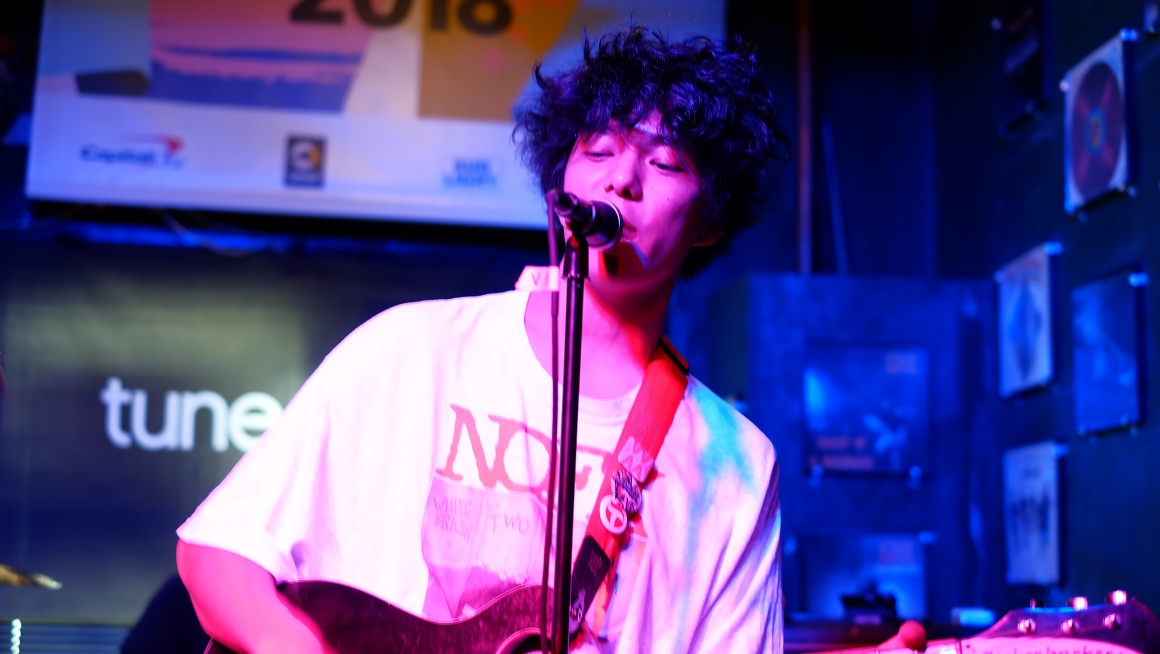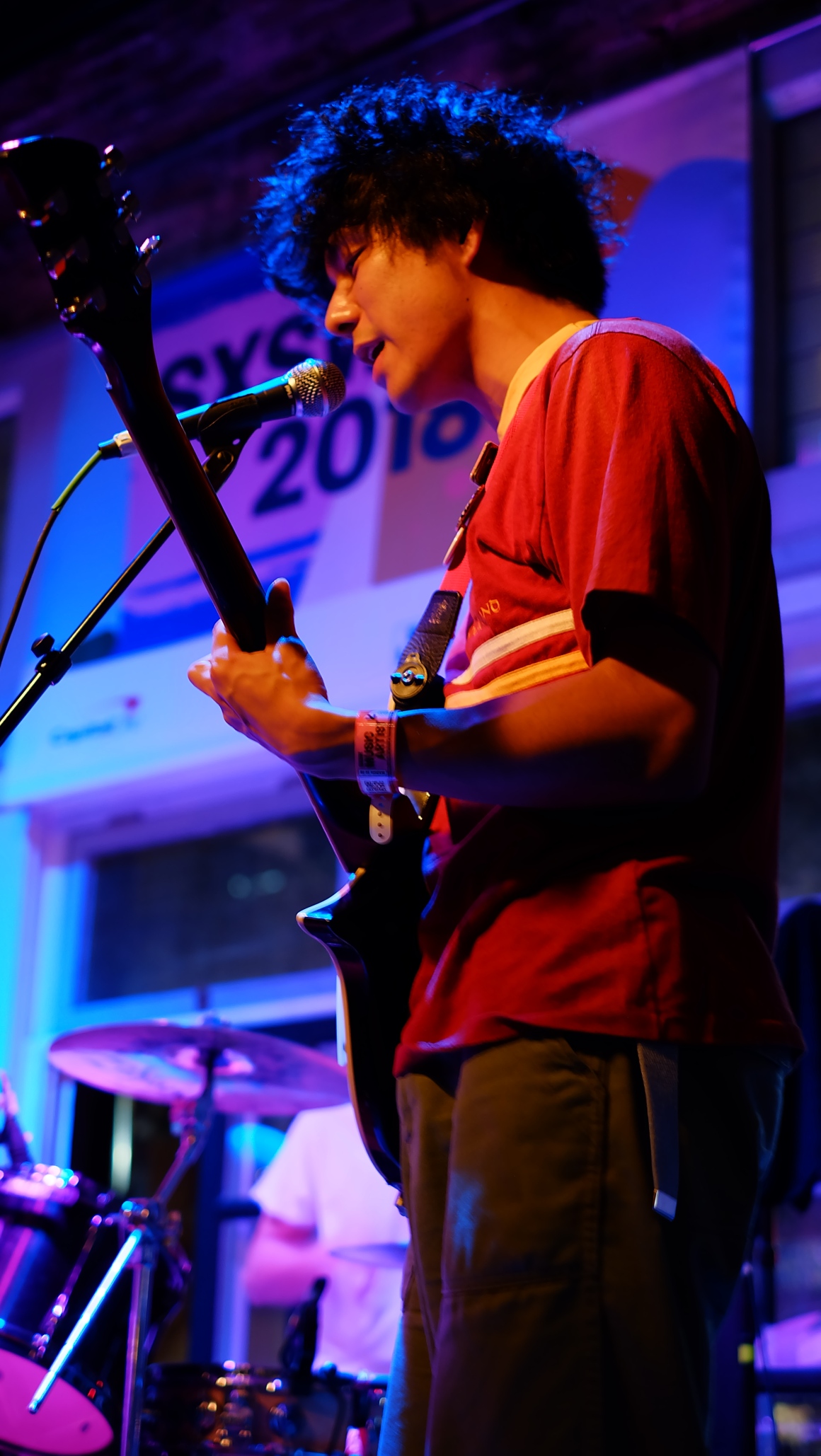![]()
Featuring Kenji Asano and Naohiko Morita on vocals/guitars, Takamasa Yoshida on bass and Naoyuki Oi on drums, surfpop quartet TENDOUJI is one of the most thriving bands in Japan. Though formed no more than two years ago, the band seems to have skipped the exploratory stage that most young bands undergo. “Asano Project”, an indie music label launched by Asano, was established at the same time TENDOUJI started and has released two EPs and one album for the band so far. They believe in self-releasing so they can do it their own way.
“Their own way” could mean a lot of other things besides music style. Despite being one of many English-singing indie rock bands in Tokyo, TENDOUJI are definitely something else. They don’t dress posh. They don’t play it cool. They suck at speaking English. They are almost entirely the opposite of avant-garde. You wonder how this band could survive in the increasingly judgmental Tokyo indie scene, especially among those who make edgy art and hang out with foreigners. But the truth is that their artlessness is exactly why they are so charming. They say they don’t want to be seen as “hip”. They are just a bunch of average dudes making simple, happy music.
![]()
KKS: Is this the first time you’ve come to America? How do you feel so far?
Morita: As a band this is our first time! But when I was seven I lived in Seattle for a short period of time. America is very different from Japan by all means.
Asano: We feel great about coming here! Love it. We enjoyed talking with some of our American fans here. They are very nice people.
KKS: Can you tell us a little about yourselves? I heard that you are all high school friends.
Morita: Actually we are junior high school classmates. We’ve just formed the band when I was 28 years old already. This is our first band. Before TENDOUJI, we did not have any other bands.
Asano: We worked normal jobs for a few years then got tired of that kind of life. So we started a band.
Morita: We have always loved music though.
KKS: What are your music influences?
Morita: I like Nirvana. And of course we are influenced by the Beatles. Mostly we listen to grunge music. Oh, and the Pixies too. I like the Pixies.
KKS: Actually before you guys came, this café was playing “Where Is My Mind” by the Pixies.
Morita & Asano: Ehhhh?? Wow!
KKS: You seem to be influenced heavily by western music.
Morita: Yeah, we love Mac Demarco and Hinds too. Their music has some lo-fi elements that we like. Now in Japan more bands are adopting this style. We hope more good Japanese bands can come to foreign countries like we did this time at SXSW and play. We’ve always had the ambition to play abroad and now finally we could do it. This is also part of the reason we sing in English.
Asano: Also when we write our songs, we write the melodies first. Then somehow we realized that English lyrics fit our melodies better.
KKS: Have you got any offers from other foreign festivals or events?
Morita: We haven’t got any offers yet, but we are interested in the Great Escape festival in the UK. Maybe some other American festivals too. Burger records has been helping us finding more shows to play. They reached out to local promoters and booked some SXSW shows for us this time.
KKS: You collaborated with Maika Loubte on your latest album – a song called “Don’t be shy”. It’s one of my favorites. Who came up with the idea of this collaboration? Who wrote the song?
Morita: Maika is a very talented musician who we admire. She asked if we’d like to do a song together and we said sure. Then I wrote the song.
Asano: We are friends and she likes our music, though our music style is different from hers.
Morita: I don’t think she cares about genres. As long as you make good music, she will love it.
KKS: Who else do you want to collaborate with next?
Morita: Hinds! We just saw their show. It was so crazy. Generally saying, we like girl bands. This time Japanese girl bands like TAWINGS and CHAI who played at SXSW are both awesome. At this moment we really don’t have any specific names in mind but we’d really love to add some female vocals into our songs.

TENDOUJI with Carlotta Cosials from Hinds. Photo by Tya_han
KKS: Ha! That’s interesting! Do you consider yourselves as feminists? You might be aware of the “Me Too” campaign in America that supports women’s rights, and there are also many feminist artists in America.
Asano: We don’t really have a very clear idea about this to be honest… It’s more about music when we say we want to add some female elements to our songs. Of course we support gender equality but in our music feminism is not mentioned as a topic yet.
Morita: We don’t usually talk about religion and politics in our music, but rather would like to keep it genuine about life.
KKS: I watched the music video of “Skippy”. It has so much life in it. I felt so rejuvenated after listening to the song and watching the video. Can I say TENDOUJI always make happy music? Is this jolly mood part of your style? Will you make any sad ballads any time soon?
Asano: Yes. You can say it’s our style.
Morita: We want to make music about things we enjoy in our life instead of negative emotions and feelings. We really don’t have any plans to write any sad ballads (laughs). We might write some melancholic lyrics but the tunes would still be jolly.
KKS: The whole vibe of the band is very down to earth. This is different from how I feel about the image of the Tokyo indie scene. How did you manage to keep it real and just be who you are?
Morita: In Tokyo, not all the bands like to socialize. A lot of them don’t talk with other bands or support each other. We go to as many shows as possible to get to know people and support them, so many people see us as nice and easygoing and that’s how we make friends.
Asano: Well…Could it be because we are slightly older than our fellow bands? (Laughs)
KKS: Do you see yourself as “big brothers” when hanging out with fellow bands?
Morita: (Laughs) It’s hard to say. Of course, we are older in terms of age, but we have not been in the music industry for very long. Some other bands may actually be younger than us but have been making music for many years so in this sense they are our “big brothers”.
KKS: What do you think of Japanese bands these days? How do you position yourself for the future?
Asano: About Japanese bands…of course there are quite a few cool bands out there, but I don’t like the entire vibe of Japanese mainstream music industry.
Morita: Those mainstream bands might be widely recognized in Japan but could be very narrow minded and may very likely not get a positive reaction overseas. By comparison, the indie bands are way cooler. With that being said, I don’t like how people are strictly dividing mainstream music and indie music. This could be an obstacle for some good underground music to be known by more people. What do you think of mainstream Japanese bands though?
KKS: Oh, you’re asking me? I know that some of those Japanese bands are very popular in Asia and Asian communities in America and Europe, but not as popular in other countries and communities. What these major Japanese bands tend to do is hire American producers who produce everything in the same way, and in the end these bands sound just like any other American bands that are produced by the same person with not much of their own style.
Morita: I agree. That’s sad.
KKS: How about American indie bands? What do you think of foreign bands nowadays in general?
Morita: Do you know Chance the Rapper? Or Kendrick Lamar? They are not indie musicians but I like their music.
KKS: Kendrick Lamar is widely accepted among many indie music lovers as well. Probably because he delivers a different kind of message than those rappers in the early 2010s who sing about luxury brands and sports cars.
Morita: Yeah, you know the Grammy’s, right? Japanese musicians are influenced by the kind of music that has won Grammy’s. We are jealous that America would have such a music award that does not discriminate music genres. They would give awards to rappers who are not that appreciated by the mass media. In Japan that’s very rare.
Asano: In Japan, we feel that the indie music is always a lot cooler than the major music, but in America that’s not always the case. Mainstream artists can make cool music, too.
KKS: What does “music” mean to you?
Morita: In TENDOUJI, four of us may have different opinions about this, but personally, music is something I cannot live with. It’s already become a vital part of my life, and I appreciate the music the most from those musicians who think the same way.
Asano: I feel the happiest when I play music. Of course, the perk for playing music full-time is you can make a living from doing it, but to me, being able to play music is simply the best thing in my life no matter what.
KKS: Tell us three things that you think are “Kawaii”, “Kakkoii”, Sugoi” for each respectively.
Morita: Girls who are straight-forward are really “Kawaii”.
Asano: Tokyo Tower is “Kakkoii”? America is “Sugoi”!




Photo by: Mena Ru

0 Comments